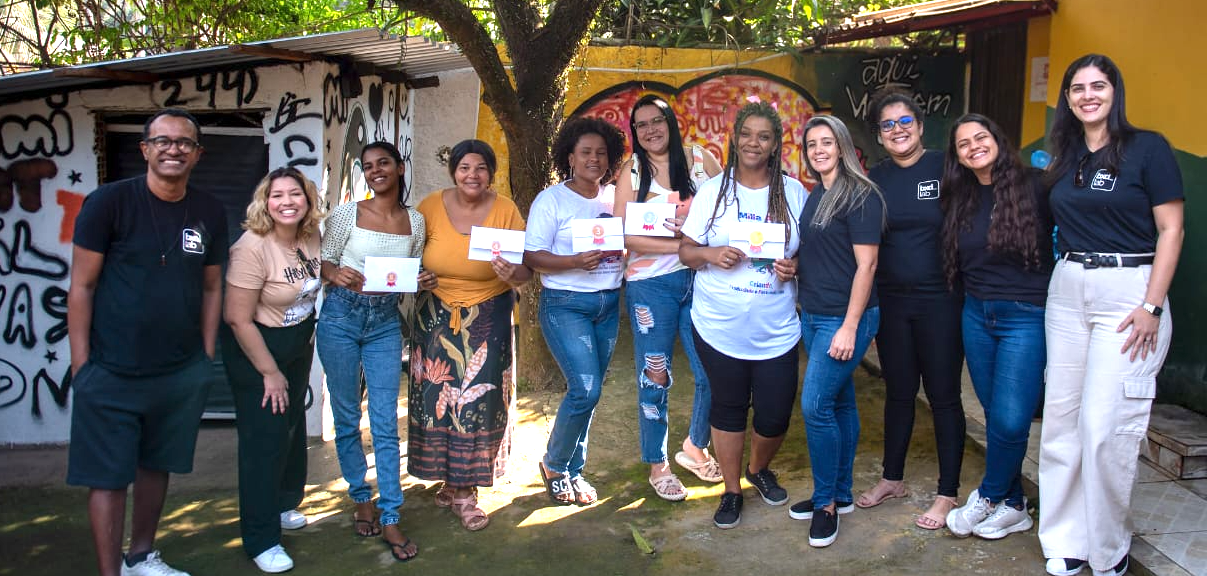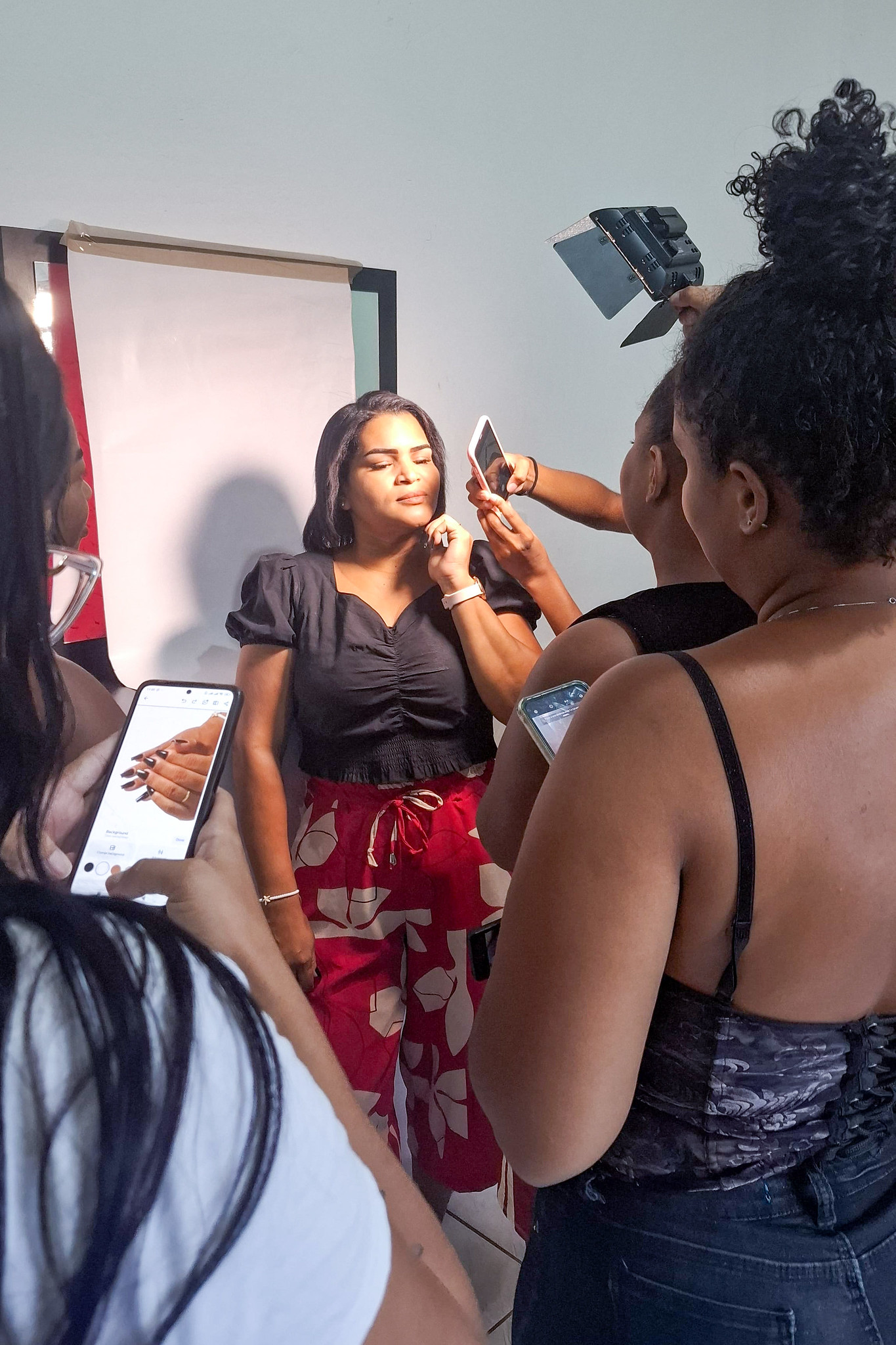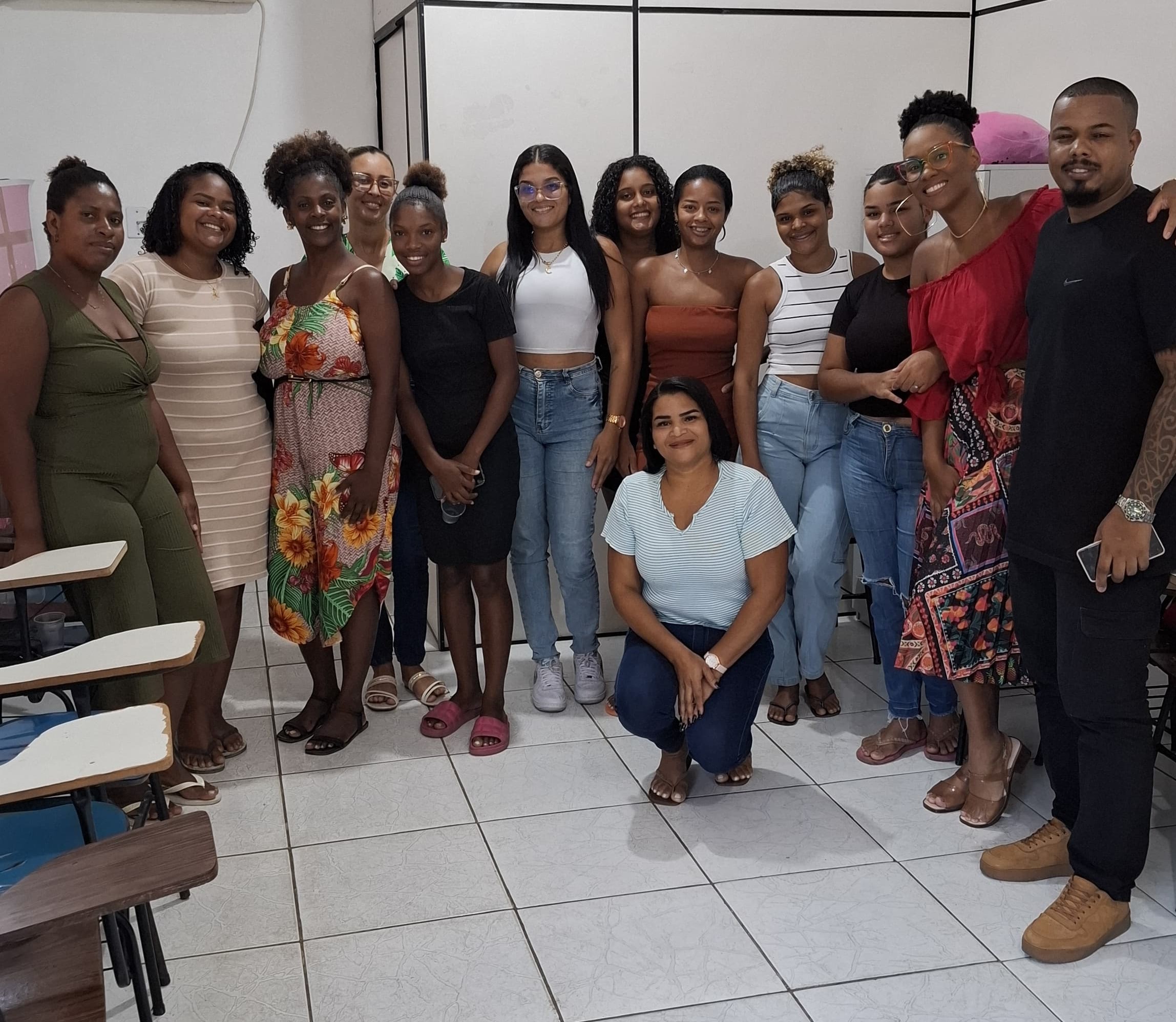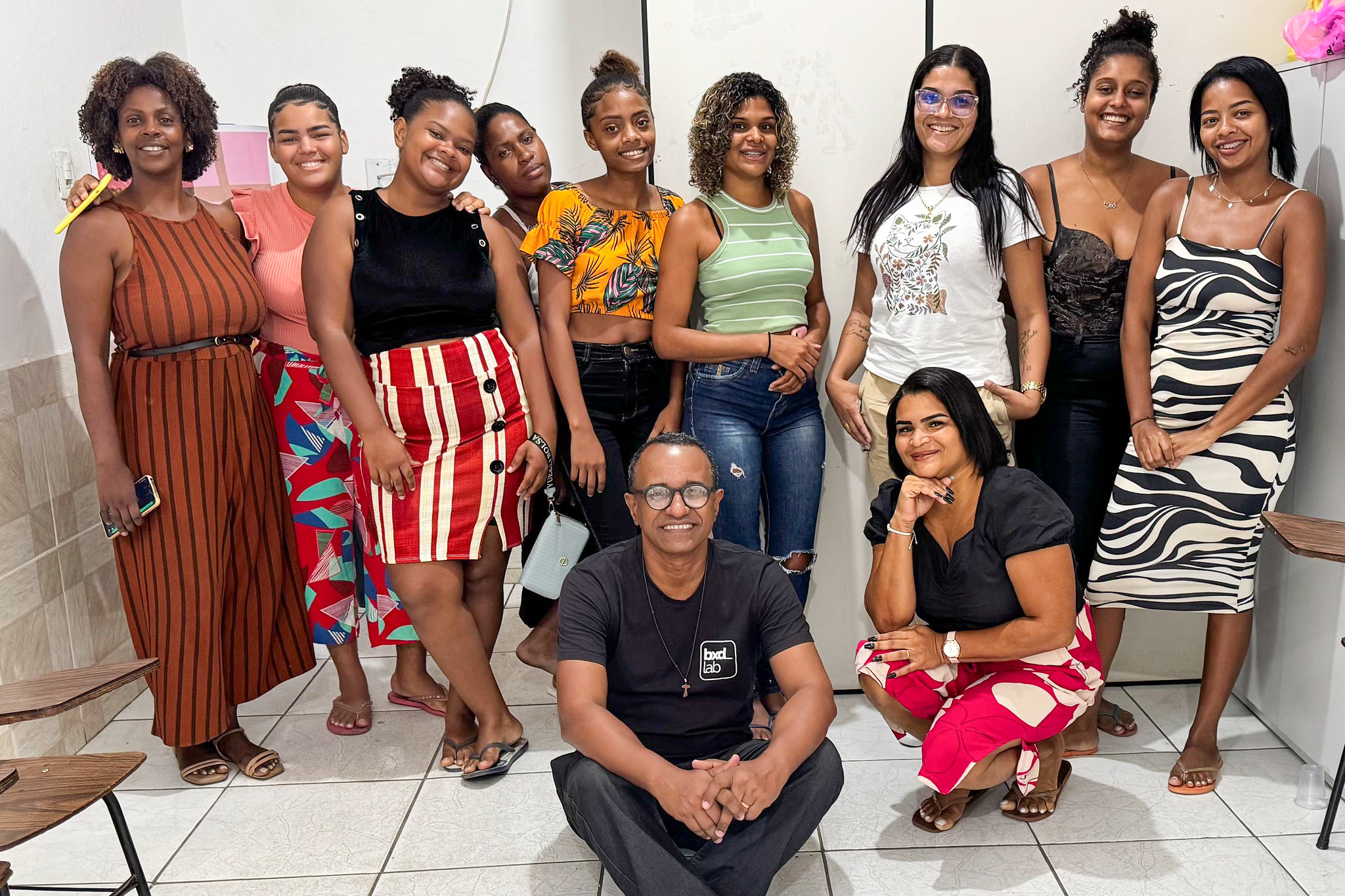
This Women’s Month, in one of the most vulnerable areas of Greater Rio de Janeiro’s Baixada Fluminense region, an initiative is transforming the lives of Black women from low-income backgrounds with limited access to education. The Pega Visão – Entrepreneurship for the Future project, by Baixada Lab, aims to strengthen financial autonomy and promote anti-racist education among women aged 18 to 50 in the Jardim Gramacho neighborhood of Duque de Caxias.
Since 2023, Pega Visão has supported mothers and young women who either run or wish to start their own businesses, promoting entrepreneurship as a tool for empowerment and income generation. In a region where thousands live on less than R$3 a day (~US$0.50), initiatives like this offer more than just economic opportunity—they create spaces for personal and community empowerment.
The project, which has already made a difference in the lives of around 100 women, brings together workshop facilitators and collaborators who run businesses in fields such as education, media, stationery, makeup, and collaborative spaces. Over the past 12 months, Pega Visão has partnered with local organizations like Pamen Cheifa. Participants are offered workshops, talks, and hands-on activities focused on brand development, creative solutions, and digital marketing. Five women have received direct investments for their businesses through Baixada Lab, with support from the Open Society Foundations and the Institute of Religious Studies (ISER).
The project is now in its second phase, launched in August 2024, with a stronger focus on social media and racial issues. With the participation of two Black women entrepreneurs—one in the beauty industry and the other in business management, the project is currently held in a local branch of the Assemblies of God church.
“I’ve been working as a nail designer, a manicurist, since I was 12. For a while, I had lost faith—until I joined the course. At first, I thought: there’s so much we don’t have here in Jardim Gramacho. That’s why having a free course is so important—to open our minds and help us follow our dreams and build a career.” — Lorrane de Pontes, Pega Visão student
One of the workshop facilitators adopted storytelling as part of her teaching approach. She began by sharing her own journey—growing up in a favela with her mother and sisters, in extremely precarious conditions. Throughout her account, she highlighted the importance of social projects, explaining that since childhood and adolescence, she had taken part in many such initiatives, which were fundamental to her studies and to accessing higher education. Despite her academic pursuits, she always wanted to become an entrepreneur in the makeup industry. During the workshop, as she taught the girls, she stressed the importance of discipline and building a strong sense of self—to avoid falling into paths like prostitution, abusive relationships, or involvement with drugs.

Racial Literacy and Jardim Gramacho
The project has been empowering women working in various fields, such as nail design, confectionery, creative stationery, clothing sales, and food services. In addition to offering professional training, the initiative integrates racial literacy into all its activities, helping participants recognize their worth and strengthen their racial identity within their social context.
“I learned that I’m capable, that I can, that I’ll be able to… through the project, I’ve been able to reinvent myself, open new windows, and keep learning every day. I used to be really scared of trying and failing. [With the] instructors, I’ve learned that it’s through our mistakes that we improve and grow.” — Camila Trindade, Pega Visão student
In her article Critical racial literacy through autobiographical narratives: with reflective activities, linguist and professor Aparecida de Jesus Ferreira writes that “critical racial literacy is the act of reflecting on race and racism. It allows us to understand how race and racism are dealt with in our daily lives, and the extent to which they impact our social identities—whether at work, school, university, within our families, or in our broader social relationships.”
By incorporating critical racial literacy in its activities, the Pega Visão project supports Black women entrepreneurs in understanding how race and racism shape their paths and business opportunities. This recognition strengthens their identities, helps them value their knowledge, and enables them to develop strategies to overcome structural barriers.
“Talking about financial autonomy in Jardim Gramacho is crucial, because we’re talking about an area impacted by Latin America’s largest landfill for over 30 years. This had lasting consequences: poor infrastructure, lack of sanitation, and an absence of public housing policy. There [in Gramacho], the State fails to meet the needs of the most precarious communities. Thinking about financial autonomy means breaking with the logic of welfare dependence, which is very present in the region, and helping to collectively build an entrepreneurial mindset in dialogue with a Paulo Freirean approach—one that reads the world before reading the word. In other words: developing a social awareness that generates financial responsibility and encourages network-based entrepreneurship. Because if the problem is structural, no single entrepreneur can solve it alone—they must create an ecosystem with other entrepreneurs in order to foster a strong local economy that can meaningfully support their businesses and clients, both within the community and beyond.” — Vladimir de Oliveira, Baixada Lab pedagogical coordinator

Historically one of the poorest areas in the Baixada Fluminense, Jardim Gramacho, in Duque de Caxias, has been marked by decades of social and economic vulnerability. The area gained international visibility with the 2010 documentary Waste Land, by visual artist Vik Muniz, which portrayed the harsh reality of recyclable waste pickers at the former landfill—once the largest in Latin America.
Even after the landfill’s closure in 2012, living conditions in the area have remained precarious—with high unemployment rates, a lack of basic infrastructure, and poor-quality public services. Amid this scenario, Jardim Gramacho is home to a number of nonprofit organizations, most of which work in social assistance, food distribution, and popular education. The Pega Visão project aims to fill a gap in initiatives that promote financial autonomy and entrepreneurial training, offering structured goals, access to resources, and ongoing support.
From the Daily Hustle to Building a Future: The Influence of Universidade da Correria on Pega Visão
The Pega Visão project was inspired by the initiative Universidade da Correria (something along the lines of ‘The Daily Hustle University’), created by writer and activist Anderson França, who organized free meetups, workshops, and talks aimed at teaching youth how to pursue entrepreneurship and challenge traditional market norms. On his blog, Tuesday Column, he shares reflections and stories about the experience and impact of the initiative.
“[Universidade da Correria was a] project I created while living in Morro do 18, and the first class came together in [Complexo da] Maré, back in 2013. I used to sell T-shirts with the project logo for R$39 (~US$6.80). With that money, I ran the first class. After five years, I had trained 4,300 Black entrepreneurs. Our school started out in an alley. I taught in narrow lanes, bars, churches, prisons, in my own home, and at the [NGO] Ação da Cidadania warehouse. The goal was to strengthen Black-owned businesses and build a Black middle class in Brazil—which still doesn’t exist. That is the biggest legacy of slavery. I’d go from favela to favela teaching classes. I was a popular educator. I was happy, teaching people how to manage their finances and build business strategies. We were an accelerator and incubator for people who had been rejected. We would set up a pitch, and many students managed to secure investment. What we built was in line with the ideals of Marcus Garvey.”
Pega Visão emerged from the same spirit: valuing the knowledge born in peripheral areas, entrepreneurial autonomy, and the creative power of the favelas. The project seeks to strengthen paths of resistance and innovation by connecting popular knowledge, opportunities, and support networks to expand the impact of businesses and initiatives led by people from peripheral areas.
“I see a pioneering aspect in what Anderson França did… This perspective can easily lean toward a utilitarian discourse—one of individualism and meritocracy. But it’s up to us to craft our own counternarrative, our critique. We have the tools for that; we’re not naive. I’m just making it clear that what we’re doing is disputing a space that the left tends to demonizes. Entrepreneurs are often viewed, let’s say, as working-class individuals co-opted by far-right rhetoric. And, to some extent, that’s not entirely wrong. However, we’re there to break through that bubble.” — Vladimir de Oliveira, Baixada Lab pedagogical coordinator

The pedagogical coordinator also highlights a point he considers fundamental, and which often comes up in conversations with the students. He explains that his work draws on a concept called “shared prosperity,” which he sees as highly relevant. According to him, the word prosperity is very present in the students’ universe, as around 90% of them come from Pentecostal or neo-Pentecostal churches, where the term is widely used in theological contexts. What is generally missing from Pentecostal discourse, however, is the element of sharing—of dividing, distributing, and multiplying—not only financial resources, but also information, technology, knowledge, support and contact networks, and above all, opportunities.
In this sense, the Pega Visão project stands out as the only initiative focused on entrepreneurial training for Black and young women in Jardim Gramacho, offering practical training, the strengthening of support networks, and direct investment in local businesses. Despite challenges such as limited funding and the absence of public facilities to host its activities, the initiative continues to empower Black women from peripheral areas, proving that entrepreneurship, education, and solidarity networks are powerful tools for transforming realities.
“As a resident of Jardim Gramacho, the Pega Visão project was a turning point for me—it gave me direction in my business. I was completely lost; I didn’t know what to do, where to go, or how to set my prices. The course gave me a clearer sense of what I want to do. It was well taught and easy to follow—with homework assignments and teachers who are active in the job market. I was lucky to receive a grant at the end of the course—that money was a blessing. I was able to make a down payment on a new piece of equipment I really needed: a 40×60 flat heat press. I’m just so thankful to the entire team and all the collaborators, who supported us and gave us strength not to give up. Even living in a place as precarious as Jardim Gramacho, we have potential. We are powerful. We are women entrepreneurs. We need to work—and give it our all.” — Monique Costa, Pega Visão student
